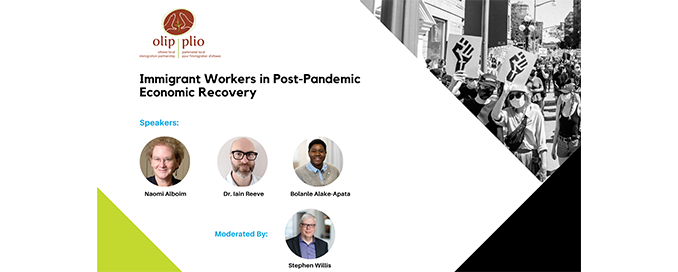The Role of Immigrant Workers in Post-Pandemic Economic Recovery
December 17, 2021Pre-existing economic injustices have fueled the devastating impact of the pandemic on immigrant workers. The unemployment rate remains high, and while the economy is recovering rapidly in some sectors, the recovery is not translating into jobs from many, and what’s more the cost of living is increasing.
As we rebuild our economy, how can we correct opportunity gaps and accessibility challenges in the labour market? How can targeted public policy and program interventions create access to quality jobs for immigrants, safer workplaces, adaptability in skills in a changing economy, and supports for women and racialized youth? What best practices can be implemented by employers for business growth through equity and diversity?
This session explored key elements of a post-pandemic economic environment, facilitated a shared understanding – among OLIP partners and stakeholders – of opportunities and challenges we should take into consideration as we set priorities for action to improve immigrants’ labour market outcomes, and helped to generate ideas for action that can help address the economic injustices facing immigrants, refugees, and racialized population in Ottawa’s post pandemic economy.
Speakers and Topics:
- Iain Reeve, Associate Director of Immigration at the Conference Board of Canada on the Role Immigrants play in Supporting Canada’s Economy and Labour Market focusing on the COVID-19 Cohort
- Naomi Alboim, Research Chair and Distinguished Fellow of the Policy Forum at the School of Policy Studies at Queen’s University on The Differential Impact of the Pandemic on Racialized Immigrant Women
- Bolanle Aleke Apata, Economist, Labour Market Information Council (LMIC) on Immigrant Labour Market Information Landscape, Labour Shortages, and Skills and Career Services
Moderator: Stephen Willis, General Manager, Planning, Infrastructure, and Economic Development, City of Ottawa
Selected Highlights:
- The City of Ottawa’s economic recovery strategy has an important pillar of talent strategy to address the talent needs and challenges of the hardest hit sectors of the pandemic including hospitality, tourism, culture, entertainment, and retail. Additionally, the talent strategy will address the most impacted labour pools including immigrants, women, and other individuals facing barriers who have been disproportionally affected by the pandemic.
- During this session, Iain presented on the changing trends in immigration levels and how immigration was impacted of the pandemic by focusing on a COVID-19 cohort. This presentation captures immigration trends using the most recent data available as well as changes over the last few years and decades.
- Naomi drew on her extensive knowledge to discuss the differential impact of the pandemic based on gender, race, and immigration status among other identities and how we can ensure an inclusive economic recovery.
- Our health care and home care systems dependent on racialized immigrant women, temporary foreign workers, and refugee claimants to provide care to the sick and elderly. These women are also the ones who have been disproportionately infected with the COVID-19 virus. Specifically, Naomi pointed out close to 50% of long-term caregivers were born outside of Canada, 26% of immigrants in these care occupations are Black women, and many are underemployed. 45% of most recent immigrants in these occupations have at least a bachelor’s degree and of these 44% have completed a degree in a health-related field, including two thirds who had a nursing degree, yet this is not the case for the non-immigrant employees in these occupations. Therefore, although immigrants are overrepresented in those with health-related education, for many these skills and knowledge is underutilized or not used at all.
- Due to the lack of recognition of immigrant qualifications achieved aboard, 77% of internationally trained medical graduates were unable to receive a residency position compared to only 6% of Canadian medical graduates. This underutilization of skills results in deskilling and a major resource being untapped to fill our growing need for healthcare professionals of all kinds everywhere in Canada. This deficiency is also contributing to a loss to Canada of up to $50 billion annually in unrealized GDP. A successful economic recovery will need more equitable and inclusive economic outcomes for currently marginalized groups.
- Through a detailed review of administrative data sources, Bolanle highlighted challenges in immigrant labour data, including data not being publicly available, infrequent timings, excluding temporary workers, and limited geographies to explore more granular issues.
- Bolanle spoke about the gaps in the immigrant labour market data landscape, the necessary metrics needed for us to understand immigrant labour market participation, and the importance of timely, relevant, and granular data to ensure an equitable economic recovery post-pandemic.
- In the context of an equitable economic recovery, Bolanle emphasized the need for easily accessible data, research planning and design to advance our understanding of immigrant economic integration and labour market participation, as well as drive policy recommendations to address the specific barriers faced by immigrants.


 Canada has been shaped by people who came from all over the world to build this country. WOW offers a platform for us to celebrate this history and the future it will help…
Canada has been shaped by people who came from all over the world to build this country. WOW offers a platform for us to celebrate this history and the future it will help…